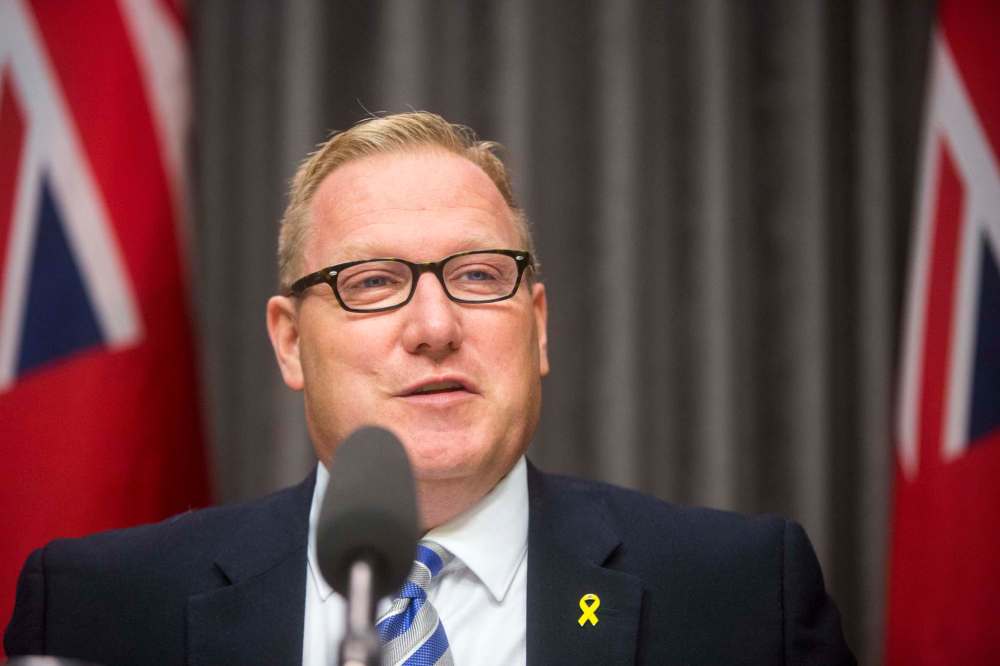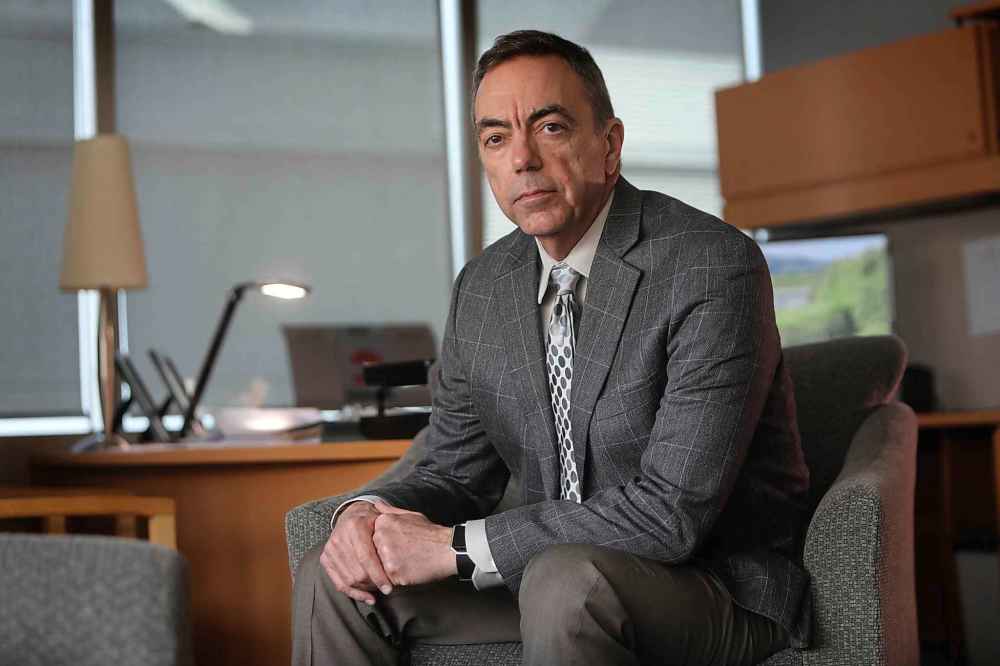Province says deficit $145-M less than expected; auditor general criticizes ‘significant errors’
Read this article for free:
or
Already have an account? Log in here »
To continue reading, please subscribe:
Monthly Digital Subscription
$1 per week for 24 weeks*
- Enjoy unlimited reading on winnipegfreepress.com
- Read the E-Edition, our digital replica newspaper
- Access News Break, our award-winning app
- Play interactive puzzles
*Billed as $4.00 plus GST every four weeks. After 24 weeks, price increases to the regular rate of $19.00 plus GST every four weeks. Offer available to new and qualified returning subscribers only. Cancel any time.
Monthly Digital Subscription
$4.75/week*
- Enjoy unlimited reading on winnipegfreepress.com
- Read the E-Edition, our digital replica newspaper
- Access News Break, our award-winning app
- Play interactive puzzles
*Billed as $19 plus GST every four weeks. Cancel any time.
To continue reading, please subscribe:
Add Free Press access to your Brandon Sun subscription for only an additional
$1 for the first 4 weeks*
*Your next subscription payment will increase by $1.00 and you will be charged $16.99 plus GST for four weeks. After four weeks, your payment will increase to $23.99 plus GST every four weeks.
Read unlimited articles for free today:
or
Already have an account? Log in here »
Hey there, time traveller!
This article was published 28/09/2018 (2590 days ago), so information in it may no longer be current.
Manitoba’s auditor general has rebuked the Progressive Conservative government for overstating the size of last year’s provincial deficit, citing two “significant errors” in the financial statements.
Norm Ricard said the government was wrong to exclude the Workers Compensation Board as a reporting entity in the government’s summary budget statements for 2017-18. He is also critical of the way in which the province transferred $265 million from the Manitoba Agricultural Services Corp. into a trust account.
“The result of these (two) errors is that the summary deficit is overstated by $347 million,” Ricard said Friday. “That is half the reported deficit.”

The auditor general’s concerns were reflected in issuing “a qualified audit opinion” of the year-end statements — the first time his office has done so since 2007, when school-board accounting was the issue.
Finance Minister Scott Fielding said the province “respectfully” disagrees.
“For far too long, governments have been taking credit for these monies,” he said. “Yet there’s no government money that’s in here. So we think that we need a true sense of accountability of how we’re doing that.
“This is especially true of Workers Compensation Board funds, which belong to employers and employees.”
However, Ricard said there have been “no relevant changes” to the Workers Compensation Act that would affect its status. He said his office’s analysis of the government’s relationship with the WCB confirms the government continues to control it.
On Friday, the government released its three-volume Public Accounts, the final accounting statement for the past fiscal year. It says the government incurred an operating deficit of $695 million for 2017-18, $145 million less than originally budgeted.
Health spending less than expected
Manitoba spent $198-million less on health expenses than forecast for 2017-18 — leaving critics alarmed about slashes to services.
Manitoba spent $198-million less on health expenses than forecast for 2017-18 — leaving critics alarmed about slashes to services.
According to the final accounting statement for the past fiscal year — the three-volume Public Accounts documents released Friday — the government noted decreased funding was “due to lower volumes of physician services delivered, fewer capital projects completed and efficiencies derived in the health system.”
Finance Minister Scott Fielding said the province is still investing record amounts in health care, including $386-million more last year than the NDP government budgeted in 2015.
“We truly think that we’re managing the health-care system better, and we’re getting better results,” he said.
Fielding said some building projects were not completed last fiscal year as planned, reducing budgeted operating costs. He referred further questions about health spending to the minister responsible, Cameron Friesen, who was not made available for interviews Friday.
In an emailed statement, the health minister touted government efficiency.
“We are taking a health-care system that was overly complex and inefficient and transforming it to one that is more accountable, more efficient and gets better patient care: emergency wait times are trending down, MRI wait times have decreased dramatically, wait times for personal care home placement in Winnipeg are at an all-time low, more doctors are practicing and nursing overtime is down,” Friesen said.
“We’ve achieved a modest 2.9 per cent under-expenditure last year by making good investments while getting better value for money. It is worth noting our government will be investing $700 million more in health care in 2018-19 than the NDP ever did.”
Included in the $198-million health spending shortfall was $46.8 million caused by “a decrease in the volume of services that physicians bill for in a number of areas, such as general practise, surgery, anesthesia and internal medicine.”
Some $24 million set aside for operating expenses went unspent due to delays in the completion of such projects as the Health Sciences Centre Women’s Hospital and a diagnostic centre of excellence.
Manitoba NDP Leader Wab Kinew was not impressed by what he perceived were erasures on health spending.
“This government is cutting health care, and it’s a big difference from all the vehement denials they’ve been putting out all year. Vehemently in the house and in the media, they always deny this. They say, ‘No, no we’re not cutting health care. No, no.’ It turns out, that’s a lie,” Kinew said. “They’re actually cutting health care for people in Manitoba.”
The province also noted a $37-million increase in federal transfers last fiscal year, including higher than anticipated Canada Health Transfers. That left Manitoba Liberal Leader Dougald Lamont wondering why some health services appear to be getting cut despite a boon of federal money.
“They could’ve spent money on all sorts of things,” Lamont said Friday, calling for more “honesty in accounting” on the government’s part.
“A budget should actually reflect what a government’s going to do. I don’t know if that’s too radical of a thing to say.”
— Jessica Botelho-Urbanski and Larry Kusch
The improvement came despite revelations this week the government had decided to make provisions for $133.8 million in unaccounted expenses — including the $82-million Phase 2 Investors Group Field construction loan — and charge them to the last fiscal year.
The auditor general said if the government had followed Canadian Public Sector Accounting standards, last year’s deficit would have been $348 million.
Why would the government overstate the size of its operating deficit?
“It’s to justify further cuts (in services), which aren’t necessary. That’s the simplest answer,” said Liberal Leader Dougald Lamont, who accused the PCs of “playing games with numbers.”
Fielding said the Tories are fixing the government’s finances and moving the province in the right direction.

Overall, the province spent $166-million less last year than it originally budgeted, he told a news conference, while revenues were $94-million higher than anticipated.
“The vast majority of departments came in under budget for the second year in a row,” the minister said.
The budget-deficit figure would have been still lower if the government had not decided to deposit $50 million into a rainy day account last year — five times more than it originally budgeted.
Fielding told reporters the government is on track to balance the budget in its second mandate and to lower the provincial sales tax, as promised, before the next election.
Todd MacKay, Prairie representative for the Canadian Taxpayers Federation, said he was pleased the government is headed in the right fiscal direction.
“We’re going to want to see more progress being made, and we’re going to want to see it faster, but at least they’re making some progress,” he said.
Manitoba was able to reduce its deficit despite a drop of more than $200 million in provincial income tax revenues caused by Ottawa’s recent amendments to the Income Tax Act, Fielding said. That was partially offset by higher-than-anticipated tax revenues ($91 million) in other areas — especially sales tax — from the 2017 Canada Summer Games and growth in the construction industry.
The province also saw higher-than-expected investment returns ($22 million), greater transfers from government business enterprises ($53 million) and $37-million more in federal transfers. As well, the province received $100-million more than expected from various other revenues, including higher tuition and a boost in post-secondary school enrolment.
larry.kusch@freepress.mb.ca
jessica.botelho@freepress.mb.ca









